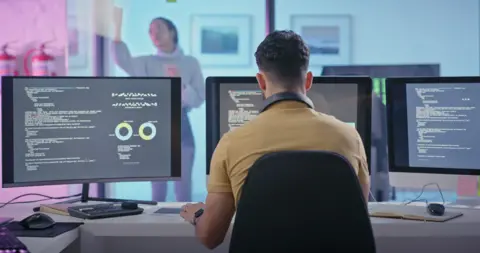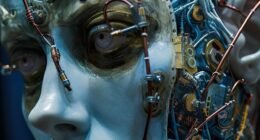There’s no doubt we’re in an AI arms race says Jon Collins.
He’s worked in IT for 35 years in various roles, including as a software programmer, systems manager and chief technology officer.
He’s now an industry analyst for research firm Gigaom.
The current arms race was spurred by the launch of ChatGPT at the end of 2022, says Mr Collins.
Since then, many such generative AI systems have emerged, and millions of people use them every day to create artwork, text or video.
For business leaders the stakes are high. Generative AI systems are very powerful tools that can digest more data in minutes than a human could in several lifetimes.
Suddenly company leaders are aware what AI could allow them, and their competition, to achieve, Mr Collins explained.
“Fear and greed is driving it,” he says. “And that creates an avalanche of momentum.”
With the right training a customised AI system could allow a company to leap ahead of its rivals with a research breakthrough, or by cutting costs by automating work currently done by humans.
In the pharmaceuticals sector, firms are customising AI to help them discover new compounds to treat disease. But it’s an expensive process.
“You need data scientists, and you need model engineers,” explains Mr Collins.
Those scientists and engineers need to understand, at least to some extent, the area of pharmaceuticals that the AI will be working in.
And it does not stop there. “You need the infrastructure engineers that can build your AI platforms,” he continues.
Such highly skilled workers are not easy to come by.
There are just not enough people who “understand how to make these systems, how to make them really perform, and how to solve some of the challenges going forward,” says Andrew Rogoyski, director of innovation at the Surrey Institute for People-Centred AI at the University of Surrey.
Salaries for those who can tackle these challenges have hit “ludicrous” levels, he adds, because they are so important.
“We could produce hundreds of AI PhDs, if we had the capacity, because people would give them jobs.”

Beyond the skills shortages, just gaining access to the physical infrastructure needed for large scale AI can be a challenge.
The sort of computer systems needed to run an AI for cancer drug research would typically require between two and three thousand of the latest computer chips.
The cost of such computer hardware alone could easily come in at upwards of $60m (£48m), even before costs for other essentials such as data storage and networking.
Part of the problem for business is that this kind of AI has appeared rather abruptly. Previous technology, like the emergence of the internet, was built up more slowly.














13 comments
I’ve read several good stuff here. Definitely worth bookmarking for revisiting. I surprise how much effort you put to make such a excellent informative web site.
Hello There. I found your blog using msn. This is an extremely well written article. I will be sure to bookmark it and return to read more of your useful info. Thanks for the post. I will certainly comeback.
Hey! I know this is somewhat off topic but I was wondering if you knew where I could find a captcha plugin for my comment form? I’m using the same blog platform as yours and I’m having problems finding one? Thanks a lot!
Good day! I know this is somewhat off topic but I was wondering which blog platform are you using for this website? I’m getting sick and tired of WordPress because I’ve had issues with hackers and I’m looking at options for another platform. I would be awesome if you could point me in the direction of a good platform.
Hi! Do you use Twitter? I’d like to follow you if that would be okay. I’m undoubtedly enjoying your blog and look forward to new posts.
you are in reality a excellent webmaster. The website loading speed is incredible. It seems that you’re doing any unique trick. Furthermore, The contents are masterpiece. you have done a wonderful process in this matter!
Glad to be one of several visitors on this awful site : D.
Hi there, just changed into alert to your weblog thru Google, and found that it is really informative. I’m going to watch out for brussels. I’ll appreciate should you proceed this in future. Many other people will be benefited from your writing. Cheers!
Hi , I do believe this is an excellent blog. I stumbled upon it on Yahoo , i will come back once again. Money and freedom is the best way to change, may you be rich and help other people.
I was looking at some of your posts on this website and I conceive this web site is rattling instructive! Keep on posting.
I am glad to be one of several visitants on this great web site (:, appreciate it for posting.
Great – I should definitely pronounce, impressed with your website. I had no trouble navigating through all tabs as well as related info ended up being truly simple to do to access. I recently found what I hoped for before you know it at all. Reasonably unusual. Is likely to appreciate it for those who add forums or anything, site theme . a tones way for your customer to communicate. Excellent task.
Nice read, I just passed this onto a colleague who was doing a little research on that. And he just bought me lunch since I found it for him smile Thus let me rephrase that: Thanks for lunch! “There are places and moments in which one is so completely alone that one sees the world entire.” by Jules Renard.